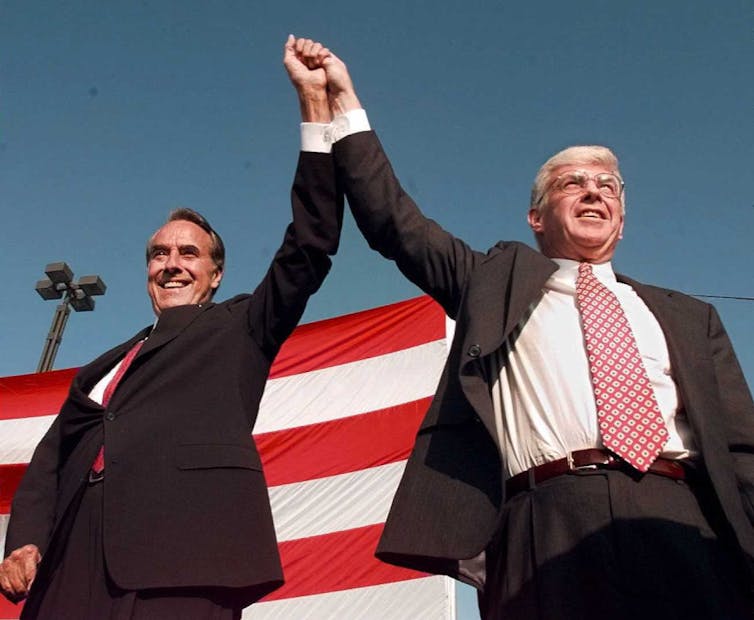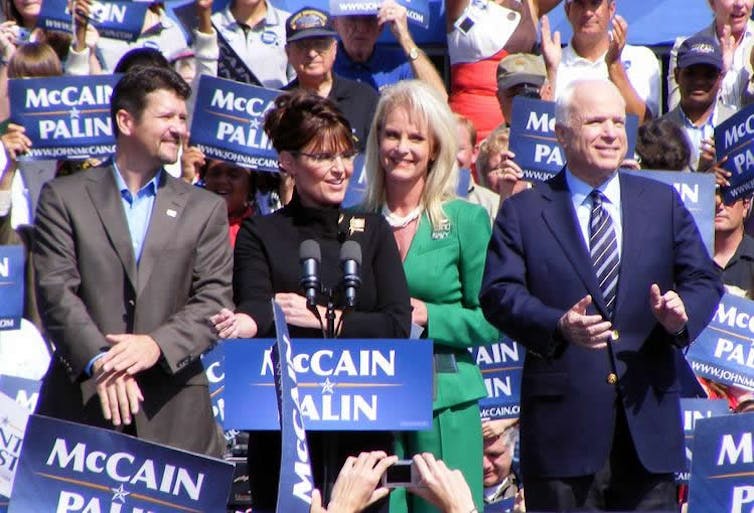Don't expect Biden's VP pick to make or break the 2020 election
- Written by Christopher Devine, Assistant Professor of Political Science, University of Dayton
As presumptive Democratic presidential nominee Joe Biden gets set to pick his vice presidential candidate, here’s a reality check: Running mates have very little direct effect on voters. When people go to the polls, they are primarily expressing a preference for the presidential candidate, not the second person on the ticket.
In our new book, “Do Running Mates Matter?[1],” my collaborator Kyle Kopko[2] and I analyze half a century of political science survey data to examine what effect a running mate has on the success of presidential candidates.
In general, voters are very unlikely to choose a presidential ticket simply because they like or dislike the second-in-command.
 Picking Jack Kemp, right, as his running mate didn’t help 1996 Republican nominee Bob Dole win the election.
J. David Ake/AFP via Getty Images[3]
Picking Jack Kemp, right, as his running mate didn’t help 1996 Republican nominee Bob Dole win the election.
J. David Ake/AFP via Getty Images[3]
On rare occasions, voters can be swayed by running mates who are much more – or less – popular than their party’s main candidate. For instance, John Kerry’s vice presidential candidate in 2004, former North Carolina Sen. John Edwards, was relatively popular with voters early in the campaign. And, as our research shows, Edwards’ popularity made voters more likely to vote for Kerry, at least in the short term.
Some political analysts[4] believe a vice presidential selection could draw key voters[5] from that person’s own demographic group or their home state[6]. We found that rarely happens, either.
[Deep knowledge, daily. Sign up for The Conversation’s newsletter[7].]
However, we found that voters view vice presidential choices as new information about the main candidate – and that information can shift voters’ views and change votes. The candidate’s choice gives voters insight into who the candidate really is, what he or she stands for and how the person might operate once in office.
Take the 2008 presidential election[8], for example, when Democrat Barack Obama ran against Republican John McCain with Joe Biden and Sarah Palin as their respective vice presidential nominees.
In our book, we demonstrate that voters who doubted Palin’s qualifications also were more likely to doubt McCain’s judgment and think he was too old to be president. As a result, they were less likely to vote for McCain.
 John McCain, right, picked Sarah Palin, second from left, as his running mate in 2008.
Rachael Dickson/Wikimedia Commons, CC BY[9][10]
John McCain, right, picked Sarah Palin, second from left, as his running mate in 2008.
Rachael Dickson/Wikimedia Commons, CC BY[9][10]
Conversely, our analysis also showed that voters who believed Biden was well qualified for office were more likely to approve of Obama’s judgment – and less likely to think he was too young to be president. As a result, they were more likely to vote for Obama.
In 2020, Joe Biden is already well known as an experienced former vice president, so it’s unlikely his running mate will outshine him on her own. But with this choice, Biden has a valuable opportunity to define himself as a candidate – and a potential president – in his own right.
What does he really stand for? What are his political priorities? And does he have the good judgment to be president?
Biden’s selection will help voters to answer these questions – and to decide whether he deserves their support in November.
Editor’s note: This is an adapted version of an earlier article[11] by Christopher Devine and Kyle Kopko originally published on May 7, 2020.
References
- ^ Do Running Mates Matter? (kansaspress.ku.edu)
- ^ Kyle Kopko (www.kylekopko.com)
- ^ J. David Ake/AFP via Getty Images (www.gettyimages.com)
- ^ Some political analysts (www.politico.com)
- ^ could draw key voters (centerforpolitics.org)
- ^ their home state (manchesteruniversitypress.co.uk)
- ^ Sign up for The Conversation’s newsletter (theconversation.com)
- ^ 2008 presidential election (www.nytimes.com)
- ^ Rachael Dickson/Wikimedia Commons (commons.wikimedia.org)
- ^ CC BY (creativecommons.org)
- ^ an earlier article (theconversation.com)
Authors: Christopher Devine, Assistant Professor of Political Science, University of Dayton
Read more https://theconversation.com/dont-expect-bidens-vp-pick-to-make-or-break-the-2020-election-141861

